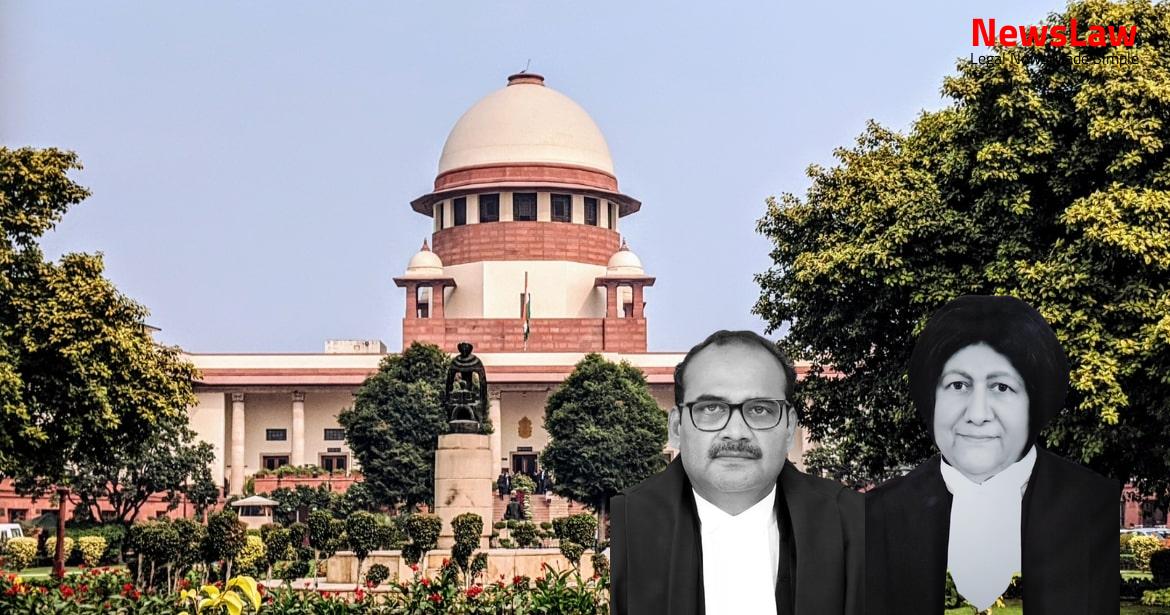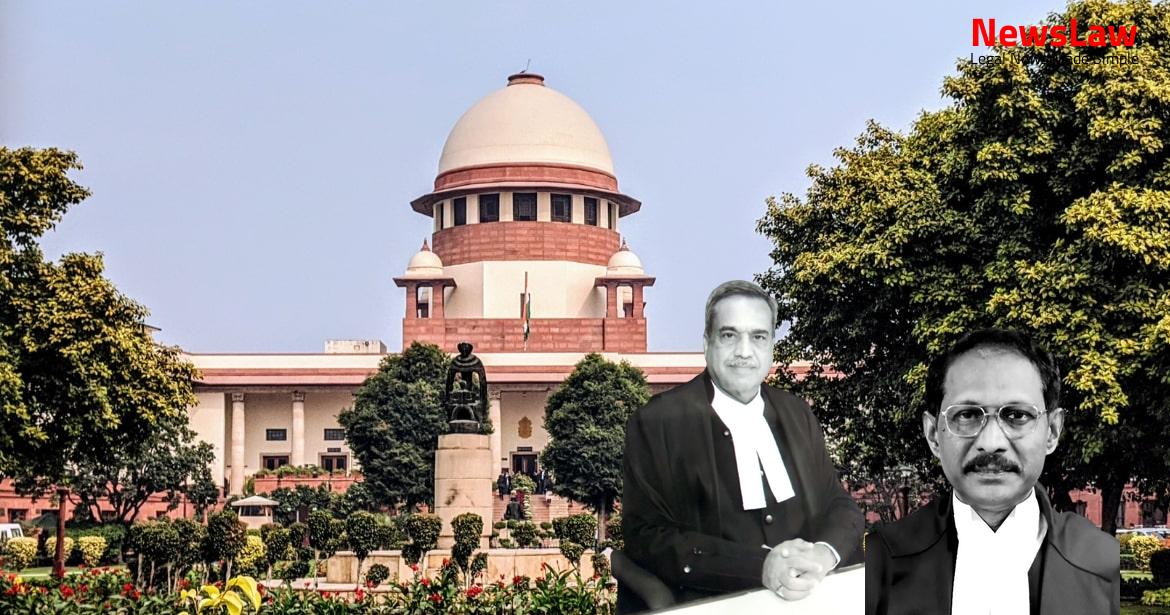Delve into the intricate legal analysis by the court in a significant case regarding the protection of reservation benefits following a state’s reorganization. The judgment meticulously evaluates the entitlement of employees to reservation privileges post-bifurcation, emphasizing the need for clarity and consistency in safeguarding individual rights. Stay informed on the implications and considerations pertinent to state reorganizations in the realm of service conditions and reservation benefits.
Facts
- Advertisement No. 9 of 2010 was issued by the Jharkhand Public Service Commission for filling up the posts of Deputy Collectors through a limited departmental examination.
- The benefit of reservation in the limited departmental examination was to be extended only to those who submit the appropriate caste certificate from the Sub-Divisional Officer posted in the State of Jharkhand.
- The appellant, belonging to the ST category, had his candidature forwarded by the office of the Registrar, Cooperative Societies, Jharkhand to the Commission and was recommended at serial No. 98 in the merit list.
- The appellant’s claim of belonging to the ST category was supported by a Certificate issued by the Scrutiny Officer, Sonpur (Saran) in Bihar.
- Post the reorganization of States, the appellant’s service was allocated to the successor State of Jharkhand, where he has been serving since then.
- The appellant challenged his non-selection by filing Writ Petition (S) No.3480 of 2013.
- The Single Judge of the High Court allowed the petition by his judgment and order dated 22.09.2017.
- In the results of the examination declared on 04.05.2013, the appellant was declared unsuccessful despite securing 123.68 marks which exceeded the cut-off for the ST category at 113.70.
Also Read: Balancing Power and Transparency: Electoral Bonds Struck Down, Disclosure Mandated
Issue
- An evaluation of whether a person, originally a resident of Bihar and belonging to Scheduled Castes/Scheduled Tribes, should be considered a migrant to Jharkhand after the bifurcation of Bihar into two successor States
- Discussion on the protection of rights and privileges of employees in the State of Bihar pre-bifurcation, as per the provisions of the Act 2000
- Consideration of whether members of Scheduled Tribes from one region should continue to receive benefits post-bifurcation under the States Reorganization Act
Also Read: Recall of Resolution Plan Approval: Legal Analysis
Arguments
- The appellant Pankaj Kumar, a serving employee in the State of Jharkhand, is entitled to claim the benefit of reservation under Sections 72 and 73 of the Act 2000.
- His status as a Scheduled Tribe candidate must be maintained even after the reorganization of the State.
- The limited departmental examination is considered accelerated promotion, allowing competent and meritorious candidates to be promoted even if junior.
- The appellant, being a reserved category candidate, carried his reservation status from the undivided State of Bihar to the State of Jharkhand after bifurcation.
- The respondents’ claim that the petitioner cannot be treated as a scheduled tribe candidate is rejected as he had been in service within the cooperative department and qualified for the examination under the State of Jharkhand.
- The appellant’s service conditions, including reservation benefits, in the promotional cadre, should not be varied to his disadvantage, and he is entitled to claim reservation benefits in the State of Jharkhand post-reorganization.
- The petitioner was allocated the Jharkhand cadre as a Scheduled Tribe candidate after the State reorganization.
- The appellant’s failure to comply with a specific advertisement requirement does not disqualify him from claiming his reserved category status in the limited departmental examination.
- The State of Jharkhand and the Commission have reiterated their submissions from the decision under challenge.
- Condition No.13 was deemed integral in the selection process, and non-compliance would disqualify a candidate from claiming ST status in the State.
- The appellant’s entitlement to claiming ST status in the context of a regular promotion was questioned.
- The appellant appeared for the Combined Civil Services Examination as a member of the SC category but was not selected, being deemed a migrant due to being a permanent resident of Patna.
Analysis
- Section 72 does not apply to members of any All-India Service.
- Services rendered by a person before the appointed day will be deemed to have been in connection with the affairs of the State or Union as per the allocation under section 72.
- Conditions of service for persons allocated to a State or Union in connection with the administration of Jharkhand will be governed by the respective rules.
- Provisions of Chapter I of Part XIV of the Constitution related to service conditions will apply, with conditions not to be varied to the person’s disadvantage without Central Government approval.
- Officers holding positions in the existing State of Bihar will continue to hold the same post or office in the successor State they fall within after the appointed day.
- The judgment discusses the need for an objective method to test the suitability of subordinate judicial officers for promotion to the Higher Judicial Service.
- It highlights the importance of maintaining protective preferences, facilities, and benefits for Scheduled Castes and Scheduled Tribes to enable them to compete on equal terms.
- The judgment emphasizes the protection of existing service conditions and reservation benefits for employees affected by reorganization enactments.
- It mentions the obligation of Parliament to ensure that individuals or groups are not disadvantaged due to reorganization.
- The summary also touches upon the need for clarity in determining entitlement to reservation benefits in different states post-reorganization.
- The judgment underscores the importance of promoting merit and efficiency in the Higher Judicial Service through appropriate selection processes.
- It discusses the implications of the Bihar Reorganisation Act, 2000 on service benefits and reservation privileges.
- The summary highlights the significance of protecting individuals from being worse off due to reorganization not of their making.
- The judgment suggests the need for detailed investigations in cases where particular areas may require special protection post-reorganization.
- The duty to provide clarity and protection in the case of state reorganizations should be consistent.
- Changes in chances of promotion do not amount to adverse change in service conditions.
- Determining Scheduled Caste or Tribe status in a state is people-centric and should be clear even after reorganization.
- The status of belonging to a caste or tribe in one state does not necessarily apply in another state.
- Limited departmental examination offers accelerated promotion based on merit.
- Recruitment to Higher Judicial Service can be through promotion or direct recruitment.
- Protective preferences and benefits like reservation are necessary for equal competition.
- Parliament has provided accommodations for disruptions impacting Scheduled Caste and Scheduled Tribe communities, like land acquisition.
- The Right to Fair Compensation Act ensures reservation benefits and other entitlements for affected tribes.
- State reorganizations occur due to political demands without individual agency.
- Involuntary movements of individuals due to state bifurcations need specific provisions for future prospects.
- Service conditions, including reservation benefits, should not be varied to the disadvantage of individuals in reorganized states.
- Justice Lalit’s observations and conclusions were agreed with
- Additional reasons mentioned also support the agreement
- The reasons provided by Justice Lalit were strong and compelling
Case Title: AKHILESH PRASAD Vs. JHARKHAND PUBLIC SERVICE COMMISSION (2022 INSC 474)
Case Number: C.A. No.-003180-003180 / 2022



